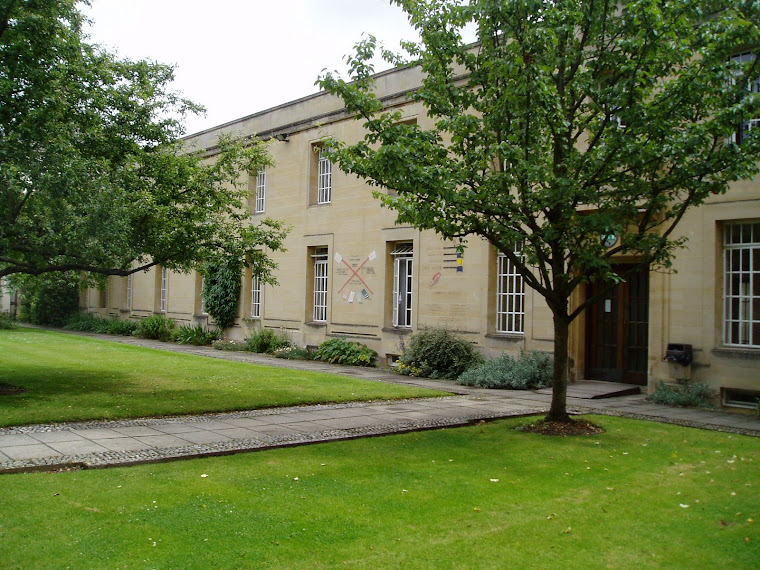Zimbabwe's catastrophic collapse is accelatering. A twenty billion dollar bill from the Reserve Bank of Zimbabwe will not buy you a loaf of bread. It is worth about as much as Monopoly money.
There are massive electricity power failures, a breakdown of water services, cholera outbreaks and
woeful shortages in medical supplies. When aid is sent into the country it is subject to demands for money and back-handers. Corruption is rife. As Mugabe's ZANU dictatorship continues to fail its people so spectacularly, Christian workers and missionary organizations are stepping in to help a needy population.
Let us pray for justice, wisdom and truth to prevail. The blood of many Zimbabeweans is on Mugabe's hands.
For further information about Christian missionary work in Zimbabwe, please see
www.frontlinefellowship.net
www.frontline.org.za
Friday, 13 March 2009
Zimbabwe - from bread basket to basket case
Tuesday, 10 March 2009
Beyond the Rat Race - further thoughts
Here is a tale based on an anecdote in Art Gish's book.
An American financial adviser on holiday, or should I say vacation, was on a beautiful island. There he met a local fisherman relaxing on the beach. They discussed the fine weather and lovely scenery. The American told the local man that he was working long hours and saving hard so that he could live in this sort of place. He loved fishing, spending time leisurely on the beach and swimming in the sea. He sold insurance policies and advised on various savings plans. He asked if the man was interested in insurance or savings plans. The man said he was not in the least interested.
"Is that wise? Surely you want to be able to plan for the future so that you can be like me and live leisurely on the beach, swim and fish," asked the American.
The local man scratched his head and declared, " But that's what I do now!"
Monday, 9 March 2009
Beyond the Rat Race - theological reflections on Art Gish's teaching
Art Gish's Beyond the Rat Race published in 1973 is a very challenging book. It still provides a tremendously powerful critique of our materialistic, spiritually bankrupt and increasingly secular society that serves mammon and actually enslaves people in debt, greed and the poverty of affluence. His book is really asking us the question posed by Amos, "What does the Lord require of you?" It is an invitation to take on simplicity as a lifestyle.
Gish gives us some great advice which is so very relevant to people living on reduced incomes in the times of the "credit crunch". Reading his book again in the 21st century brings new challenges and fresh insights. I am on a journey to live a simpler lifestyle. I can appreciate that the more we free ourselves from unnecessary clutter, the richer our lives become. There is an impoverishment in worldly affluence, self indulgence, greed and selfish consumerism. Embracing a simpler, more environmentally friendly and ecologically responsible lifesyle brings many benefits.
Some of the comments in the first part of the book may seem a bit banal and silly, but this book is worth reading to the end. It has controversial teaching, pithy sayings and memorable anecdotes. He even argues that wealth is theft, which is not really biblical, but he has a heart for the poor and wishes to help the needy. Gish contends that "One cannot be wealthy without stealing from others." Is this true of Abraham, Joseph and Solomon? AG probably does not know of dear Christian people who use their income wisely, and manage to create wealth and well being through their generosity. Art Gish is a man of peace and integrity. He is well known for his pacifist convictions.
Gish advises us to spend less and enjoy more in life. He advocates that Christians should work towards a caring, sharing community. Community is a natural outworking of the Christian vision.
He maintains that bourgeois American lifestyle is incompatible with following Jesus; we should not be conformed to this world but be transformed by the renewal of our minds, as taught in Romans 12:2.
Since the days of Mrs Thatcher, we in the UK have taken on targets to achieve economy, efficiency and effectiveness but we have neglected ethics. It is more blessed to give than to receive, but our whole worldly wise society wants to grab rather than to give. People may have material riches but also spiritual impoverishment.
Applying Gish's teaching may be hard and almost impossible for some Christians caught up in the health and wealth, Word of Faith theology, but it would be a powerful witness in a needy and greedy world. We live in a society that is all at sea in times of economic uncertainty and spiritual turmoil. Will a simpler lifestyle help us to reach the lost? Art Gish certainly believes so.
Saturday, 21 February 2009
Post-charismatic?
Recently I bought a copy of Rob McAlpine's book Post-Charismatic at a Christian bookshop.
This book has arisen from the disappointment, disillusionment, and discord experienced by people who have left charismatic fellowships. Rob McAlpine highlights the repellent and controversial aspects of the charismatic movement, which include televangelism, the Prosperity teachings, and the Shepherding and Latter Rain movements. I enjoyed reading his historical analysis and insights.
He attempts to define post-charismatic: "the process of separating what is truly of the Holy Spirit and what is needless - and often harmful - baggage is the whole idea behind developing a post-charismatic understanding of how a supernatural God works supernaturally amongst and through the mystical gathering called the body".
The author clearly struggles with the term "post-charismatic". In his final section he writes that while it is certainly accurate as a description, "it lacks the ability to point to a way forward, which was the whole reason for writing in the first place".
Rob McAlpine is hoping that a post-charismatic understanding of how the Holy Spirit works will serve as a critique of 'charismania' excesses and questionable teachings, and will lead to a more mature and balanced understanding, expectation and functioning in the Spirit of Christ.
For some the way forward is "charismissional" which wishes to take the best of the missional approach to life/ministry and ground it in the vibrancy of the Spirit. For Rob McAlpine, 'missional' simply means that " we stop viewing ecclesiology and missiology as separate, and explore ways of being a missionary presence in our postmodern society".
I believe that Rob offers us his "post-charismatic but not post-Spirit" position but others are still emerging and will be manifest in various forms. His position is, therefore, one of many post-charismatic positions. Christians are talking about post-charismatic journeys and experiences. I expect to see more books and blogs on this subject. Some may arrive at some sort of revised charismatic or modified charismatic position. For others, the pain, the negative experiences and abuses will keep them away from any form of charismatic Christianity.
I pray for a truly biblical trinitarian charismatic Christianity that shows the amazing charisma of God. It has been refined and proved to be genuine; it has no weird or repellent elements as the dross has been burned away. It combines the gifts and fruits of the Spirit of God; it participates in the divine nature and escapes the corruption in the world caused by evil desires.
Thursday, 19 February 2009
Victims of Bishop Michael Reid
I have just read through a blog about the infamous Bishop Michael Reid called Victims of Bishop Michael Reid. Sadly there are victims of this man's ministry and there are lessons to be learned. I expected that this man would try to re-establish a ministry. You can read my previous comments about his decline and fall. He will now find it more difficult to raise funds and fleece the flock.
You can visit the blog concerning this man's victims and his unpleasant ministry by following the link below:
http://victimsofbishopmichaelreid.blogspot.com/
He's not the anointed one; he's been a very naughty boy!
You have been warned!
Monday, 16 February 2009
The reality of women's ministry today
Opponents of women's ministry appeal to the Scriptures in 1 Timothy 2:11-15 and 1 Corinthians 14: 34-35. On the basis of these passages women have been forbidden to teach, preach and take on leadership positions in the church.
There are problems in prohibiting women preaching, teaching and leading because there are clearly some very gifted women preachers and ministers in the church today. Do we deny that God has called and equipped them? There are certain verses which indicate that women, in the New Testament, prophesied in the church, taught and exercised some sort of leadership positions. I would ask you to consider the following texts:
Acts 2:17-18
Acts 18: 24-26
Acts 21:9
Romans 16: 1-4, 19
Philippians 4: 2-3.
The Bible tells us of women who had various leadership roles: Sarah, Deborah, Esther, Abigail, Mary, Phoebe, Priscilla, Euodia and Syntyche.
Church history has many examples of women in ministry. It is a fact that not all good preachers and evangelists are men!
In defence of theology
There are some preachers and Christians who claim that theology is of no value. They do not understand that theology is the study of God. In preaching, teaching and talking about God they are involved in theology, in theological discussion! Once you start talking about God then you enter the realm of theology. There is no getting away from that. Once you start commenting on Scripture and what is found in the Bible then you are involved in theological matters. All the authors of the books in the Bible were therefore theologians.
Through the help of theologians we have had accurate translations of the Bible, helpful commentaries, sermons and messages. Through theologians we have had creeds and doctrinal statements that have kept us from heresy and false doctrine. Our understanding of the Trinity has been helped considerably by the work of theologians. The Holy Spirit has worked through theologians.
Through theology we can understand our theological heritage, our doctrinal position and historical church perspective. Whatever theological position you hold it comes with a historical and cultural context, though you may not be aware of it through ignorance and lack of understanding. The Christian doctrines and practices that you hold dear have been shaped by certain theological developments and traditions. Theology can help you to discover how these doctrines were formed and how they have developed. Every Christian is therefore a theologian, though not every theologian is a Christian.
There is sound theology and there is bad theology. Not all theology is good and helpful.
But good theology will lead you into the wonderful truths of God.
Dedham

River Stour
































































































































